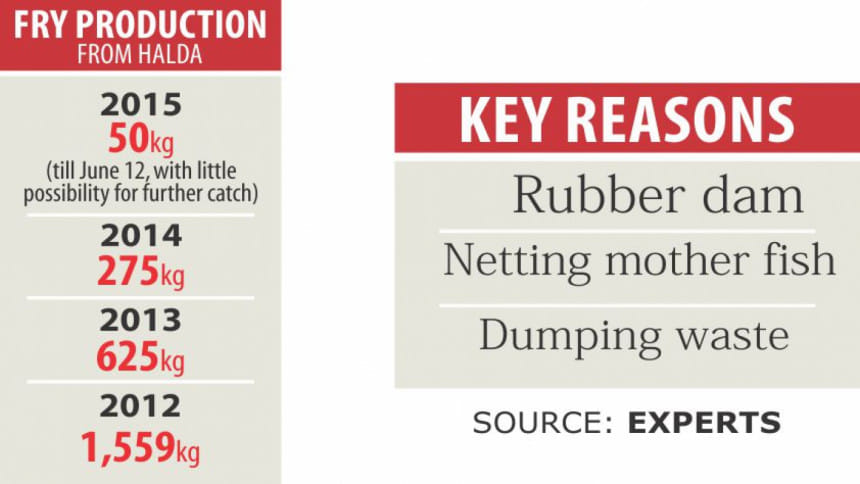Halda sees drastic fall in spawn production

Since the wee hours of yesterday, there were boatloads of fishermen drifting in the Halda river. They had waited for months because the day's catch would bring them the major part of their annual incomes. But it was a huge disappointment this time around.
Several hundred fishermen went back home with poor catches of eggs from Halda, the largest and lone natural spawning ground for carp fish in the country, and the major source of their livelihoods.
"With high hopes, we went down the river taking our boats and nets, but it was a big disappointment," said Dilip Das, fisherman from Madrasa area. "The fish laid a small amount of eggs." He collected only a bucketful yesterday.
According to Halda expert Manzoorul Kibria, at least 1,500 fishermen -- or 75,000 people if their family members are counted in -- are directly dependent on the spawns produced in this river. They collect the eggs, hatch them, and then sell the fry at high prices, he said.
If the collectors of the fry and the people who eventually farm those in ponds are taken into consideration, this would be a huge network of people who live on Halda spawns, he told The Daily Star.
But there has been a drastic fall of spawn production in the river this year. According to fishermen, yesterday's total catch of eggs would produce around 30kg of fry. In April, the fishermen had catches which added up to 20kg of fry in all.
Kibira, also a professor of zoology at Chittagong University, said the mother fish released eggs between April and June every year while fishermen collected those immediately afterwards, especially when there were rain and thunder or high and low tides in the river.
"There is little chance of further catches of spawns this season," he said.
So, this year Halda has apparently produced 50kg of fry, while it was 275kg in 2014, 625kg in 2013, and a whopping 1,559kg in 2012.
Kamal Uddin, fisherman from Garduara, said he collected only three buckets of spawns, taking seven boats each rented for Tk 5,000.
"For collecting spawns, I also hired two men for each boat based on the agreement that we would share the catch," he said, adding that many fishermen were going to face losses.
Manzoorul Kibria said one kilogramme of fry sold at Tk 65,000 in April.
For the drastic drop in spawn production, the expert blamed disposal of tannery and chemical waste into the river, illegal netting of mother fish, and the cross-rubber dam built at Bhujpur in 2011 for irrigation, obstructing the natural flow of water.
These are destroying the spawning grounds, he said.
Around 250 boats were in the river yesterday, some since 3:00am, to collect spawns.

 For all latest news, follow The Daily Star's Google News channel.
For all latest news, follow The Daily Star's Google News channel. 



Comments